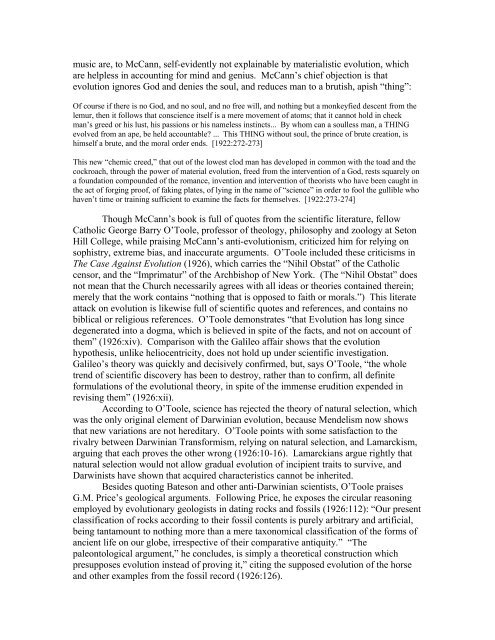Creationism - National Center for Science Education
Creationism - National Center for Science Education
Creationism - National Center for Science Education
You also want an ePaper? Increase the reach of your titles
YUMPU automatically turns print PDFs into web optimized ePapers that Google loves.
music are, to McCann, self-evidently not explainable by materialistic evolution, which<br />
are helpless in accounting <strong>for</strong> mind and genius. McCann’s chief objection is that<br />
evolution ignores God and denies the soul, and reduces man to a brutish, apish “thing”:<br />
Of course if there is no God, and no soul, and no free will, and nothing but a monkeyfied descent from the<br />
lemur, then it follows that conscience itself is a mere movement of atoms; that it cannot hold in check<br />
man’s greed or his lust, his passions or his nameless instincts... By whom can a soulless man, a THING<br />
evolved from an ape, be held accountable? ... This THING without soul, the prince of brute creation, is<br />
himself a brute, and the moral order ends. [1922:272-273]<br />
This new “chemic creed,” that out of the lowest clod man has developed in common with the toad and the<br />
cockroach, through the power of material evolution, freed from the intervention of a God, rests squarely on<br />
a foundation compounded of the romance, invention and intervention of theorists who have been caught in<br />
the act of <strong>for</strong>ging proof, of faking plates, of lying in the name of “science” in order to fool the gullible who<br />
haven’t time or training sufficient to examine the facts <strong>for</strong> themselves. [1922:273-274]<br />
Though McCann’s book is full of quotes from the scientific literature, fellow<br />
Catholic George Barry O’Toole, professor of theology, philosophy and zoology at Seton<br />
Hill College, while praising McCann’s anti-evolutionism, criticized him <strong>for</strong> relying on<br />
sophistry, extreme bias, and inaccurate arguments. O’Toole included these criticisms in<br />
The Case Against Evolution (1926), which carries the “Nihil Obstat” of the Catholic<br />
censor, and the “Imprimatur” of the Archbishop of New York. (The “Nihil Obstat” does<br />
not mean that the Church necessarily agrees with all ideas or theories contained therein;<br />
merely that the work contains “nothing that is opposed to faith or morals.”) This literate<br />
attack on evolution is likewise full of scientific quotes and references, and contains no<br />
biblical or religious references. O’Toole demonstrates “that Evolution has long since<br />
degenerated into a dogma, which is believed in spite of the facts, and not on account of<br />
them” (1926:xiv). Comparison with the Galileo affair shows that the evolution<br />
hypothesis, unlike heliocentricity, does not hold up under scientific investigation.<br />
Galileo’s theory was quickly and decisively confirmed, but, says O’Toole, “the whole<br />
trend of scientific discovery has been to destroy, rather than to confirm, all definite<br />
<strong>for</strong>mulations of the evolutional theory, in spite of the immense erudition expended in<br />
revising them” (1926:xii).<br />
According to O’Toole, science has rejected the theory of natural selection, which<br />
was the only original element of Darwinian evolution, because Mendelism now shows<br />
that new variations are not hereditary. O’Toole points with some satisfaction to the<br />
rivalry between Darwinian Trans<strong>for</strong>mism, relying on natural selection, and Lamarckism,<br />
arguing that each proves the other wrong (1926:10-16). Lamarckians argue rightly that<br />
natural selection would not allow gradual evolution of incipient traits to survive, and<br />
Darwinists have shown that acquired characteristics cannot be inherited.<br />
Besides quoting Bateson and other anti-Darwinian scientists, O’Toole praises<br />
G.M. Price’s geological arguments. Following Price, he exposes the circular reasoning<br />
employed by evolutionary geologists in dating rocks and fossils (1926:112): “Our present<br />
classification of rocks according to their fossil contents is purely arbitrary and artificial,<br />
being tantamount to nothing more than a mere taxonomical classification of the <strong>for</strong>ms of<br />
ancient life on our globe, irrespective of their comparative antiquity.” “The<br />
paleontological argument,” he concludes, is simply a theoretical construction which<br />
presupposes evolution instead of proving it,” citing the supposed evolution of the horse<br />
and other examples from the fossil record (1926:126).

















